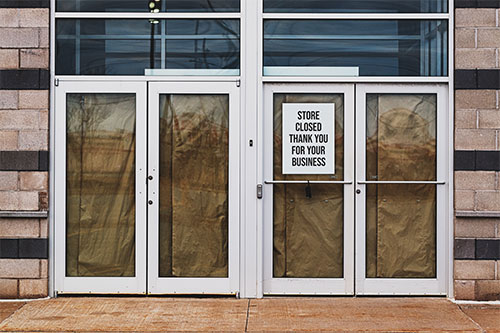Dying Malls and Small Business Opportunity
Generations of Americans grew up not only shopping in sprawling malls but recreating there as well. Parents looking for teenagers would often find them at the mall, meeting friends, and window shopping. Often families would make a day of mall shopping, getting lunch at the food court.
In the past decade or so, things began to change. Online shopping has steadily eroded volume and margins. Major anchor stores like Sears and Macy’s closed stores in droves. When the anchors leave, the satellite businesses are left with lower traffic, sinking sales, and often closing as their only option.
COVID-19 and the Trend
Along came COVID-19, and the pandemic created a push-pull effect. Some large malls began to attract traffic by providing vaccine centers. However, many, especially those already in trouble, found that the pandemic merely increased online shopping, further damaging their business. Many economists are predicting a steady decline in mall traffic, more closures on a regular basis, and large footprint structures with uncertain usage futures. 2021 is considered a year of reckoning for underperforming propertiesi.
The proof was illustrated by Black Friday 2020. Foot traffic was decimated, and it was the quietest in 20 years. Preliminary data from Sensormatic Solutions showed in-store Black Friday traffic dropped by 52.1%. Another analytics firm found that foot traffic was down nearly 50% for 16 leading malls nationally.
The Repurposing Begins
From CNBC.comii: “The U.S. mall owner Macerich announced Thursday it’s sold a majority stake in Paradise Valley Mall in Phoenix, for $100 million, to a joint venture with an affiliate of the Phoenix-based, mixed-use real estate company RED Development. The partners will convert the 92-acre site into a community with homes, offices, and a grocery store.
The 1970s-era Paradise Valley Mall has been rezoned to allow the sprawling plot of land to include high-end grocery options, restaurants, 3.25 million square feet of residential space, office buildings and some retail shops.”
Some economists go so far as to state that the sprawling shopping mall concept has reached the end of its useful life. Mall property owners are beginning to face the decision as to whether to sell the properties, often at a significant loss, or to repurpose the structures. Community leaders are working with these owners to rezone the properties for other uses that can both enhance the community and services, but also make the properties income-generators again. Each mall will be a unique case study, as communities differ, and the surrounding businesses and consumer demographics will influence decisions.
Opportunity for Small Businesses
If there are major malls in your market area, and particularly if one or more have empty space, investigate opportunities. If your business needs retail, office, or warehouse space, there could be some that may come with local government or economic incentives. It is in everyone’s best interests to repurpose the space with vibrant business and community resources.
When business and government cooperate for local economic development, being early in the process can be a major benefit.
i Shopping malls were struggling before COVID-19 and now have more empty stores: What's next after the pandemic?, USAToday.com
ii Phoenix mall owner sells out as property is rezoned for other uses, CNBC.com

